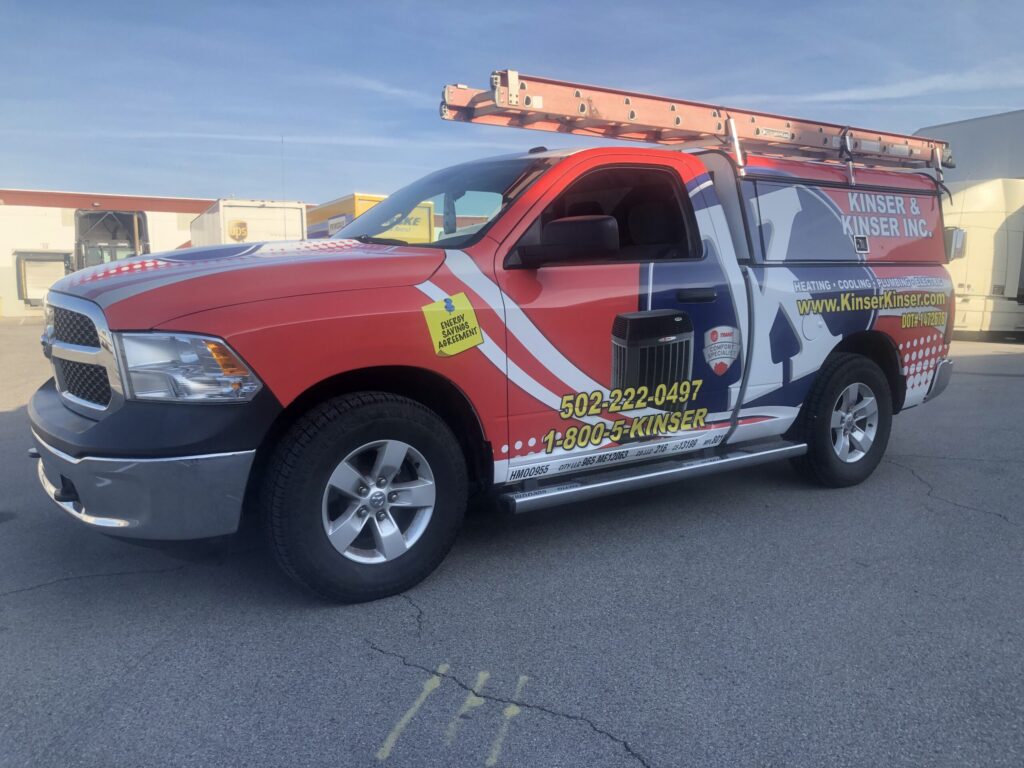Vehicle wraps are one of the most powerful tools for mobile advertising, but their longevity depends on how well you take care of them.
In today’s guide, we’ll cover key durability factors like material type, installation quality, exposure to the elements and ongoing maintenance and repairs.
Average Lifespan of a Car Wrap
Standard Vinyl Wraps
5 to 7 years on average with proper care. This is the industry standard for high-quality commercial wraps installed by professionals.
Cast Vinyl Wraps (Premium Grade)
7 to 10 years. Ideal for full wraps and complex curves. Known for better durability, shrink resistance, UV protection, etc..
Calendared Vinyl Wraps (Economy Grade)
3 to 5 years. Best for short-term or budget-friendly wraps, such as event promos or seasonal campaigns.
Perforated Window Films
1 to 3 years. These are used for rear window graphics. They’re more vulnerable due to thin material and visibility holes.
Lifespan Based on Surface and Vehicle Type
| Surface Type | Durability Factors | Expected Lifespan |
| Glass | Fine with proper lamination | 1 – 3 years |
| Textured or Matte Paint | Low adhesion, may lift earlier | 3 – 5 years |
| Aluminum | May need primers for adhesion | 3 – 6 years |
| Fiberglass | May need primers for adhesion | 3 – 6 years |
| Smooth OEM Paint | Ideal adhesion, minimal peeling | 5 – 7+ years |
Vehicle Type Considerations
Commercial Vans and Trucks: Typically have longer wrap life due to larger, flatter surfaces.
Sports Cars or Curved Body Styles: May experience earlier lifting around tight curves unless installed with cast vinyl and heat sealing.
RVs and Trailers: UV exposure is higher; expect faster fading if not garaged.
Tips to Make Your Wrap Last Longer
Protect your investment by reducing damage from environmental factors (like sun exposure) or everyday wear (tears and creases). The better you care for your vehicle wrap, the longer it will last.
1. Choose High Quality Materials
This is the most important consideration for car wrap durability. The materials you choose set the foundation for how long your wrap will last.
Not all vinyl is created equal. Industry-trusted cast vinyl materials, such as 3M certified or Avery Dennison products, are engineered for long term applications and offer excellent flexibility. These high quality materials conform to curves and crevices better than budget options and are less likely to shrink, fade, or crack over time.
Cast vinyl also provides built-in UV protection, which is essential for blocking sun exposure and preventing the color degradation that happens from constant UV rays. Especially in climates with a lot of sunlight or in commercial vehicles that stay on the road all day, this type of vinyl pays off quickly.
Choosing a premium wrap film might involve a higher upfront investment, but it can actually reduce replacement costs in the long run. A properly selected and applied material can protect your paint job and preserve the look of your branding through all kinds of weather and driving conditions.
2. Invest in Professional Installation
Even the most durable car wrap won’t perform well if it’s not installed correctly. If you’re investing in car wraps durability, improper application can shave years off your investment.
Professional installation ensures that the wrap is applied without bubbles, creases, misalignments or other imperfections that can lead to early failure. Installers trained in vinyl application techniques know how to stretch and heat the material properly so it adheres to every surface securely.
3. Park Your Car in Shade or Indoors
Of everything the great outdoors can throw at your car, nothing is as aggressive as the sun. Constant sun exposure accelerates the breakdown of vinyl material (especially on the roof, hood and trunk). Parking your car in a garage, under a carport, or in shaded areas during the day can significantly reduce the impact of UV rays and heat buildup on your wrap film.
Even if covered parking isn’t available all the time at your home or business, any reduction in direct sunlight will help. Consider using a vehicle cover if your wrapped car sits outside for extended periods. While car wraps are designed to handle outdoor environments, minimizing sun damage helps your wrap last longer and maintain its vibrant color.
Parking indoors also protects the wrap from tree sap, seeds, bird droppings and extreme weather conditions. These contaminants degrade the wrapping materials over time and dull the graphics’ colors and definition.
4. Wash Regularly and Gently
Cleaning is a critical part of proper care for any wrapped car. Regular washing helps remove dirt and pollutants that can slowly eat away at the surface of the vinyl. Use only pH-neutral, non-abrasive soaps and soft microfiber towels or sponges to avoid scratching the surface.
Also, avoid automated car washing, especially those with rotating brushes, as they can lift edges, scratch the wrap, or cause premature wear or moisture infiltration.
5. Avoid Pressure Washing Edges
If you must use a pressure washer, take great care.
Direct contact with pressurized water, especially around seams and edges, can loosen or lift the wrap and affect adhesion. This weakens the bond to the paint job and reduces wrap durability.
Above all, use a fan nozzle instead of a direct jet. Keep the pressure below 2000 PSI and maintain a distance of at least 12 inches. Never focus the stream on one spot, especially on seams.
6. Use Wrap-Safe Sealants
Incorporating vinyl-safe sealants into your maintenance routine can significantly extend the life of your car wraps. These products are designed to bond with wrapping materials and provide additional layers of UV protection and water resistance. By reducing the impact of the elements, they help the wrap maintain its color, texture and flexibility over time.
Sealants or ceramic coatings should be applied every few months for best results. Make sure to avoid using waxes or sealants meant for traditional paint jobs, as they may contain solvents that degrade vinyl. Always check that any product used is wrap-approved. It’s one of the simplest ways to make your wrap last longer.
7. Repair Small Issues Early
Even the best vehicle wrap can fail prematurely if not maintained with attention to detail.
If you notice a lifted edge, small tear, or air bubble, take action immediately. Otherwise, you allow debris and moisture to get under the wrap film and compromise the adhesive. Timely intervention also protects the underlying paint job from damage, since moisture intrusion could lead to rust or other issues.
And yes, partial repairs are possible, too. Professional installers can often patch small problem areas without redoing the entire wrap. That’s why frequent inspection and fast response are crucial for long term performance.
Learning how to extend wrap durability looks like consistent care, fast action and using the right techniques at every stage. When in doubt, trust professionals like Matly Digital Solutions to guide you through safe maintenance and repair options for your wrapped car.

